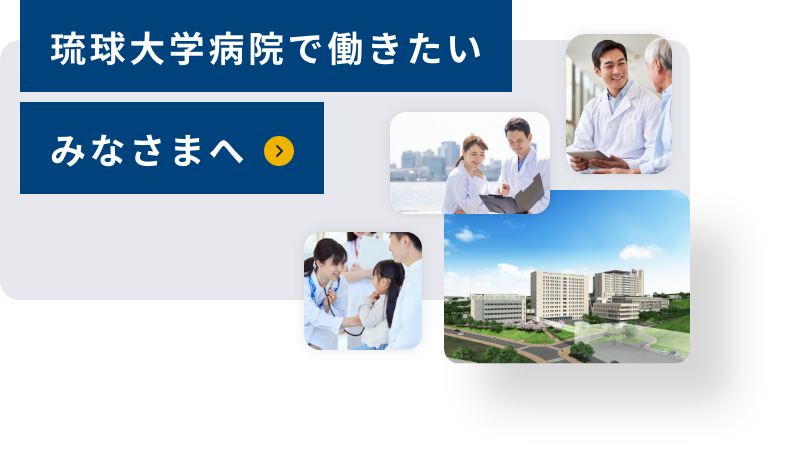琉球大学病院について
患者さんの権利と責務・子どもの患者権利憲章
琉球大学病院では、患者さんを中心とした「安全・安心・思いやり」に基づくより良い医療を目指しております。患者さんとの深い信頼関係の上に成り立つ医療の大切さを十分に理解するとともに、患者さんには一人一人に次のような権利と責務があることを確認いたします。
患者さんの権利Patients’ rights
- あなたは、どんな場合でも、一人の人間として大切に扱われる権利があります。
- あなたは、どのような境遇、環境であっても、専門家による平等で良質な医療を受ける権利があります。
- あなたは、病気のことや治療について十分に教えてもらう権利があります。
- あなたは、治療について意見を述べる権利と選択できる権利があります。
- あなたは、あなた自身の話したこと、病気、身体について、知られたくないことを守られる権利があります。
患者さんの責務Patient responsibilities
- 最善かつ適切な診療を行うために、あなた自身の健康状態についてできるだけ正確に伝えてください。
- 主治医や担当医の治療や退院計画に主体的に取組み協力してください。
- すべての患者さんが適切な医療を受けられるように、病院の規則に従い、医療の妨げとならないように協力してください。特に攻撃的な態度や暴言、乱暴な行為は謹み、施設の所有物を大切に使うようにしてください。
- 責務について遵守していただけない場合、診療を継続できなくなることがあります。
(また、警察に通報させていただく場合があります。)
平成22年8月制定
平成29年2月13日一部改正
琉球大学病院は、「子どもの患者権利憲章」(あなたのために、病院の人やあなたのご家族が守らなければならない決まりごと)を守って、あなたを助けていきます。
琉球大学病院「子どもの患者権利憲章(かんじゃけんりけんしょう)」Child Patient Rights
- 子どもの患者さんは、いつでもひとりの人間として大切にされます。
(こどものかんじゃさんは、いつでもひとりのにんげんとしてたいせつにされます。) - 子どもの患者さんは、どんな病気であっても、もっともよいと考えられる診療を受けることができます。
(こどものかんじゃさんは、どんなびょうきであっても、もっともよいとかんがえられるしんりょうをうけることができます。) - 子どもの患者さんは、病気のことや病気を治していく方法について、それぞれの年齢や理解度にあわせて、十分な説明を受けることができます。
(こどものかんじゃさんは、びょうきのことやびょうきをなおしていくほうほうについて、それぞれのねんれいやりかいどにあわせて、じゅうぶんなせつめいをうけることができます。) - 子どもの患者さんは、病気のことや病気を治していく方法について、自分の考えを病院の人やご家族に伝えることができます。
(こどものかんじゃさんは、びょうきのことやびょうきをなおしていくほうほうについて、じぶんのかんがえをびょういんのひとやごかぞくにつたえることができます。) - 子どもの患者さんは、自分の健康について自分で決められないとき、子どもに代わってご家族に決めてもらうことができます。
(こどものかんじゃさんは、じぶんのけんこうについてじぶんできめられないとき、こどもにかわってごかぞくにきめてもらうことができます。) - 子どもの患者さんは、不安なことやわからないことがあるときは、病院の人やご家族に話したり、聞いたりすることができます。
(こどものかんじゃさんは、ふあんなことやわからないことがあるときは、びょういんのひとやごかぞくにはなしたり、きいたりすることができます。) - 子どもの患者さんは、からだや心の成長や発達に必要なことを病院の人からケアを受けることができます。
(こどものかんじゃさんは、からだやこころのせいちょうやはったつにひつようなことをびょういんのひとからけあをうけることができます。) - 子どもの患者さんは、親または親に代わる人と一緒に過ごすことができます。
(こどものかんじゃさんは、おやまたはおやにかわるひとといっしょにすごすことができます。) - 子どもの患者さんは、年齢や症状にあわせて、遊び、レクリエーションに参加し、教育を受けることができます。
(こどものかんじゃさんは、ねんれいやしょうじょうにあわせて、あそび、れくりえーしょんにさんかし、きょういくをうけることができます。) - 子どもの患者さんのプライバシーは、いつでも守られます。
(こどものかんじゃさんは、ぷらいばしーはいつでもまもられます。)
令和2年2月制定
令和2年6月16日一部改正




